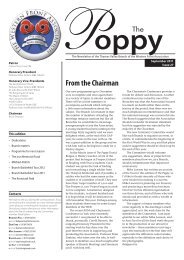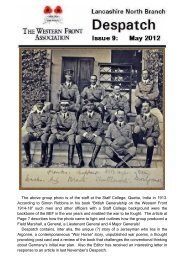The_Poppy_March_2012.pdf - The Western Front Association
The_Poppy_March_2012.pdf - The Western Front Association
The_Poppy_March_2012.pdf - The Western Front Association
Create successful ePaper yourself
Turn your PDF publications into a flip-book with our unique Google optimized e-Paper software.
Programme for 2012*<br />
Details of the meetings for the remainder of our 26th season<br />
are set out below and the Branch Committee hopes that<br />
you agree the programme offers a wide variety of different<br />
subjects to meet most interests. However, should you have<br />
any comments on the programme or suggestions for future<br />
topics and speakers then please let us know.<br />
All meetings are held at the Berkshire Sports and Social<br />
Club, Sonning Lane, Reading on the last Thursday of each<br />
month (except December) commencing at 8.00 p.m.<br />
29th <strong>March</strong> 2012 – Prof. Richard Grayson BA, D.Phil<br />
“<strong>The</strong> Belfast Boys: How the Unionists and Republicans fought side by<br />
side in the First World War”<br />
Belfast’s Loyalist murals depict many images of the First World War. <strong>The</strong> 36th Ulster<br />
Division, in which so many forebears of today’s Ulster Loyalists fought and died, is a<br />
regular theme for these gable-end remembrances. Alongside the 36th was the 16th<br />
Division, which recruited Irishmen from Belfast, England and elsewhere. <strong>The</strong> 36th<br />
contained many members of the Ulster Volunteer Force (UVF) and the 16th included<br />
many of the pro-Home Rule Irish Volunteers. Yet, instead of fighting it out in a civil war<br />
on the streets of Belfast, the UVF and the Volunteers fought together at the Somme.<br />
While the 36th is heavily remembered, the 16th merits no equivalent memorialising<br />
among Nationalists. <strong>The</strong> 36th Division, with its strong associations in Protestant<br />
Belfast, is the chosen symbol of the Unionists’ war-time sacrifices. <strong>The</strong> 16th reminded<br />
Nationalists of their service for Britain and her Empire but, when British troops were in<br />
Northern Ireland, they had no desire to commemorate the fact.<br />
26th April 2012 – Paul Cobb<br />
“Fromelles, 1916”<br />
At Fromelles in July 1916, two divisions - one British and one Australian - within a few<br />
weeks of arriving in France went into action for the first time. <strong>The</strong>ir task was to prevent<br />
the Germans from moving troops to the Somme, where a major British offensive was in<br />
progress but the attack on 19th/20th July 1916 was a disaster with 7,000 casualties in<br />
just a few hours. Paul’s talk explores this battle, which for many epitomises the futility<br />
of the Great War. During that brief time many heroic deeds were done but the battle<br />
caused a souring of Anglo-Australian relationships and truly was a baptism of fire for<br />
these British and Australian troops. This is their history.<br />
31st May 2012 – Ian Cull<br />
“Battlecruisers, Lions or Lemons?”<br />
As part of his redesign of the Royal Navy from 1900 to 1908, Jackie Fisher introduced a<br />
new class of heavy cruiser, which combined the firepower of a battleship with the speed<br />
of a cruiser. At the battle of Jutland, in 1916, they proved to be a disaster, with three<br />
being sunk with almost all their crews. Was the design flawed, or were they victims of<br />
Admiral Beatty’s leadership?<br />
28th June 2012 – Jon Cooksey<br />
“All’s Well With England, Poulton’s On His Game, Ronald Poulton Palmer:<br />
Sporting Legend and Soldier”<br />
Ronald Poulton Palmer was one of the England’s biggest rugby stars before the First<br />
World War, playing 17 internationals and scoring eight tries. He was born in 1889 and<br />
was a member of the Huntley and Palmer family. Ronald was set to inherit the well<br />
known biscuit manufacturing business but on the outbreak of war volunteered to serve<br />
with the Royal Berkshire Regiment. He was killed by a sniper’s bullet at Ploegsteert<br />
Wood on 5th May 1915, age 25.<br />
*See full list in next column<br />
Programme for Next Season<br />
September 2012 to June 2013<br />
<strong>The</strong> programme of speakers for next season is now<br />
confirmed. Please make a note in your diary of the<br />
following dates for speakers and topics:<br />
27th September 2012 – Taff Gillingham<br />
<strong>The</strong> Development of Uniforms and Equipment of the<br />
Great War British Infantryman<br />
25th October 2012 – Andy Robertshaw<br />
Ghosts on the Somme<br />
29th November 2012 – Tony Taylor-Neale<br />
Germany at War - Taking on the World<br />
20th December 2012 – Edward Dixon<br />
Postcards of the Great War<br />
31st January 2013 – Prof. Gary Sheffield<br />
tba<br />
28th February 2013 – Verne Littleyl<br />
<strong>The</strong> Basra CWGC War Cemetery and Memorial to<br />
the Missing – World War 1 to 2005<br />
28th <strong>March</strong> 2013 – Fraser Skirrow<br />
How Tactical Capabilities Developed in one<br />
Territorial Battalion from 1916-1918<br />
25th April 2013 – Stephen Cooper<br />
<strong>The</strong> Final Whistle: A History of the Great War in 15<br />
Players (Rosslyn Park Rugby Club)<br />
30th May 2013 – Aimée Fox-Godden<br />
<strong>The</strong> word ‘retire’ is never to be used – Command in<br />
the 9th Brigade AIF at First Passchendaele 1917<br />
27th June 2013 – Prof. John Derry<br />
General Horne<br />
21



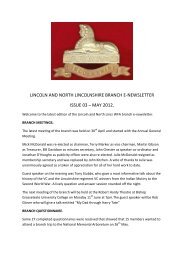
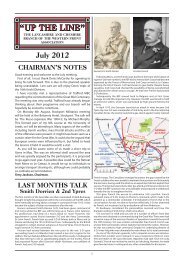
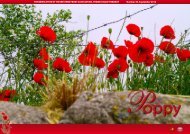
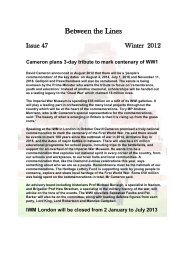
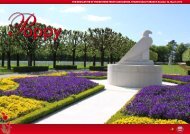
![Fromelles Australian Working List[1].pdf - The Western Front ...](https://img.yumpu.com/29972632/1/184x260/fromelles-australian-working-list1pdf-the-western-front-.jpg?quality=85)
